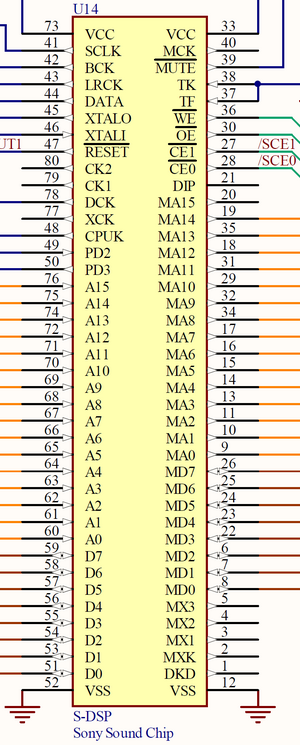We've just updated MediaWiki and its underlying software. If anything doesn't look or work quite right, please mention it to us. --RanAS
S-DSP: Difference between revisions
From SnesLab
(more proper name) |
(added memory map) |
||
| Line 3: | Line 3: | ||
The '''S-DSP''' is the digital signal processor. It produces audio for the [[DAC]] and is controlled by the [[S-SMP]]. It is clocked by [[X2]]. | The '''S-DSP''' is the digital signal processor. It produces audio for the [[DAC]] and is controlled by the [[S-SMP]]. It is clocked by [[X2]]. | ||
It has 128 registers (DSPRAM) that can be manipulated by the S-SMP, some of which serve no hard-wired purpose and can be used as general-purpose RAM. | It has 128 registers (DSPRAM) that can be manipulated by the S-SMP, some of which serve no hard-wired purpose and can be used as general-purpose RAM. Some of them are: | ||
{| class="wikitable" | |||
! Address !! Register | |||
|- | |||
| 00 || VOL (L) | |||
|- | |||
| 01 || VOL (R) | |||
|- | |||
| 02 || P (L) | |||
|- | |||
| 03 || P (H) | |||
|- | |||
| 04 || SRCN | |||
|- | |||
| 05 || ADSR (1) | |||
|- | |||
| 06 || ADSR (2) | |||
|- | |||
| 07 || GAIN | |||
|- | |||
| 08 || ENVX | |||
|- | |||
| 09 || OUTX | |||
|- | |||
| || | |||
|- | |||
| 0C || MVOL (L) | |||
|- | |||
| 1C || MVOL (R) | |||
|- | |||
| 2C || EVOL (L) | |||
|- | |||
| 3C || EVOL (R) | |||
|- | |||
| 4C || KON | |||
|- | |||
| 5C || KOF | |||
|- | |||
| 6C || FLG | |||
|- | |||
| 7C || ENDX | |||
|- | |||
| 0D || EFB | |||
|- | |||
| 1D || --- | |||
|- | |||
| 2D || PMON | |||
|- | |||
| 3D || NON | |||
|- | |||
| 4D || EON | |||
|- | |||
| 5D || DIR | |||
|- | |||
| 6D || ESA | |||
|- | |||
| 7D || EDL | |||
|} | |||
The highest sound frequency that the S-DSP can produce is 16kHz, because of the 32kHz rate that sample-points are output. <sup>[1]</sup> | The highest sound frequency that the S-DSP can produce is 16kHz, because of the 32kHz rate that sample-points are output. <sup>[1]</sup> | ||
Revision as of 01:22, 18 December 2023

S-DSP in region D4 of the jwdonal schematic
The S-DSP is the digital signal processor. It produces audio for the DAC and is controlled by the S-SMP. It is clocked by X2.
It has 128 registers (DSPRAM) that can be manipulated by the S-SMP, some of which serve no hard-wired purpose and can be used as general-purpose RAM. Some of them are:
| Address | Register |
|---|---|
| 00 | VOL (L) |
| 01 | VOL (R) |
| 02 | P (L) |
| 03 | P (H) |
| 04 | SRCN |
| 05 | ADSR (1) |
| 06 | ADSR (2) |
| 07 | GAIN |
| 08 | ENVX |
| 09 | OUTX |
| 0C | MVOL (L) |
| 1C | MVOL (R) |
| 2C | EVOL (L) |
| 3C | EVOL (R) |
| 4C | KON |
| 5C | KOF |
| 6C | FLG |
| 7C | ENDX |
| 0D | EFB |
| 1D | --- |
| 2D | PMON |
| 3D | NON |
| 4D | EON |
| 5D | DIR |
| 6D | ESA |
| 7D | EDL |
The highest sound frequency that the S-DSP can produce is 16kHz, because of the 32kHz rate that sample-points are output. [1]

